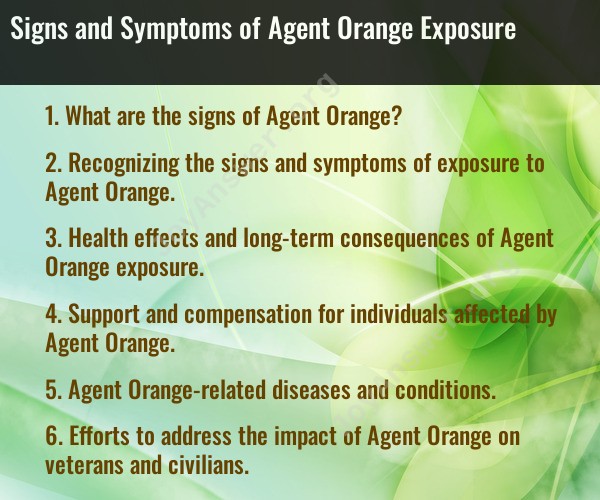What are the signs of Agent Orange?
Exposure to Agent Orange, a chemical herbicide used during the Vietnam War, has been associated with various health issues and conditions. The signs and symptoms of Agent Orange exposure can vary depending on the duration and intensity of exposure, as well as individual factors. Some common signs and symptoms associated with Agent Orange exposure may include:
Skin Conditions:
- Chloracne: A distinctive skin condition characterized by the development of acne-like lesions, often on the face, neck, and other areas. Chloracne is considered one of the hallmark signs of Agent Orange exposure.
Respiratory Issues:
- Coughing
- Shortness of breath
- Wheezing
- Reduced lung function
- Chronic obstructive pulmonary disease (COPD)
Neurological Symptoms:
- Numbness or tingling in the extremities
- Muscle weakness
- Balance and coordination problems
- Tremors
- Speech difficulties
Cancer:
- Various types of cancer have been linked to Agent Orange exposure, including prostate cancer, lung cancer, non-Hodgkin's lymphoma, and others.
Gastrointestinal Issues:
- Digestive problems
- Stomach pain
- Changes in bowel habits
Cardiovascular Problems:
- Ischemic heart disease, which can lead to chest pain and other heart-related issues.
Endocrine Disorders:
- Type 2 diabetes, which can result in symptoms like increased thirst, frequent urination, and unexplained weight loss.
Reproductive and Birth Defects:
- Some studies have suggested a link between Agent Orange exposure and certain birth defects in the children of exposed veterans.
It's important to note that not all individuals exposed to Agent Orange will experience these symptoms, and some individuals may not exhibit any immediate signs of exposure. Additionally, the onset of health issues related to Agent Orange exposure may occur years after the exposure.
If you are a veteran who was exposed to Agent Orange and are experiencing health problems, it's important to seek medical evaluation and contact the U.S. Department of Veterans Affairs (VA) to discuss potential benefits and healthcare services available to you. The VA recognizes certain conditions as "presumptive" for veterans who served in specific areas of Vietnam during designated time periods and experienced Agent Orange exposure.
Recognizing the signs and symptoms of exposure to Agent Orange
The signs and symptoms of exposure to Agent Orange can vary depending on the level and duration of exposure. Some of the most common signs and symptoms include:
- Skin problems: Chloracne, a severe skin condition with acne-like lesions, is one of the most common signs of Agent Orange exposure. Other skin problems that may occur include rashes, itching, and hyperpigmentation.
- Respiratory problems: Agent Orange exposure can damage the lungs and lead to a variety of respiratory problems, such as bronchitis, shortness of breath, and asthma.
- Cancer: Agent Orange is a known carcinogen, and exposure has been linked to a number of types of cancer, including leukemia, lymphoma, and prostate cancer.
- Neurological problems: Agent Orange exposure can also damage the nervous system and lead to a variety of neurological problems, such as peripheral neuropathy, Parkinson's disease, and Alzheimer's disease.
- Birth defects: Agent Orange exposure has also been linked to a number of birth defects, such as spina bifida, cleft lip and palate, and limb defects.
Health effects and long-term consequences of Agent Orange exposure
The health effects of Agent Orange exposure can vary depending on the level and duration of exposure. Some of the long-term consequences of Agent Orange exposure include:
- Cancer: Agent Orange exposure is a known risk factor for a number of types of cancer, including leukemia, lymphoma, and prostate cancer.
- Diabetes: Agent Orange exposure has also been linked to an increased risk of type 2 diabetes.
- Parkinson's disease: Agent Orange exposure is a known risk factor for Parkinson's disease, a progressive neurodegenerative disorder that affects movement and coordination.
- Peripheral neuropathy: Agent Orange exposure can damage the peripheral nerves, leading to numbness, tingling, and pain in the hands and feet.
- Birth defects: Children born to parents who were exposed to Agent Orange are at an increased risk of birth defects, such as spina bifida, cleft lip and palate, and limb defects.
Support and compensation for individuals affected by Agent Orange
The United States Department of Veterans Affairs (VA) provides a variety of support and compensation to individuals who have been affected by Agent Orange exposure. These benefits include:
- Medical care: The VA provides free medical care to veterans who have been diagnosed with a disability related to Agent Orange exposure.
- Disability benefits: Veterans who have been disabled by Agent Orange exposure may be eligible for monthly disability payments from the VA.
- Survivors' benefits: Survivors of veterans who died from a disability related to Agent Orange exposure may be eligible for death benefits from the VA.
In addition to the VA, there are a number of other organizations that provide support and services to individuals affected by Agent Orange exposure. These organizations include:
- Vietnam Veterans of America
- Veterans of Foreign Wars
- Disabled American Veterans
- Paralyzed Veterans of America
- Agent Orange Survivors Vietnam Alliance
Agent Orange-related diseases and conditions
The VA has a list of presumptive diseases that are assumed to be caused by Agent Orange exposure. These diseases include:
- Chloracne
- Non-Hodgkin's lymphoma
- Hodgkin's disease
- Chronic lymphocytic leukemia
- Multiple myeloma
- Porphyria cutanea tarda
- Soft tissue sarcoma
- Respiratory cancers
- Type 2 diabetes
- Parkinson's disease
- Ischemic heart disease
- Peripheral neuropathy
- Prostate cancer
Efforts to address the impact of Agent Orange on veterans and civilians
The United States government has made a number of efforts to address the impact of Agent Orange on veterans and civilians. These efforts include:
- The Agent Orange Act of 1991: This act established a fund to provide compensation to veterans who were exposed to Agent Orange and who developed certain diseases.
- The Agent Orange Exposure Screening Program: This program provides free medical exams to veterans who were exposed to Agent Orange.
- The Vietnam Veterans Health Care Amendments of 1986: This act established a presumption of service connection for certain diseases in veterans who served in Vietnam.
The United States government has also provided funding for research on the health effects of Agent Orange exposure. This research has helped to improve the understanding of the long-term consequences of Agent Orange exposure and to develop better treatments for veterans and civilians who have been affected by Agent Orange.













